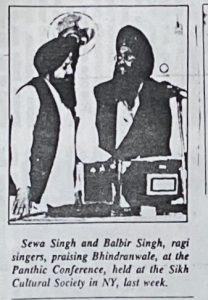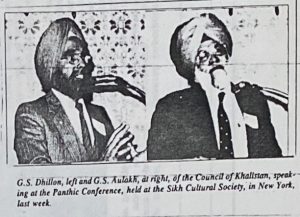February 2, 1990, News India, Page 19
NEW VOIRK-DATELIIE
Representatives of nearly 25 Sikh organizations—several of them identified as militant groups in the United States, Canada, U K and W Germany, assembled at a Panthic Conference at the Sikh Cultural Society, in Richmond Hill, N Y —unanimously passed a resolution demanding the formation of Khalistan “where fundamental rights of all people will be fully guaranteed, respected and protected ” “We reassert our inalienable fundamental human right of self-determination, as enshrined in the U N Charter and the universal declaration of human rights, to retrieve our sovereign entity as a free nation and to establish a commonwealth of the Khalsa called Khalistan”, the resolution said The heavily-worded resolution which was passed January 27 by the organizations in the presence of the Sikh unto —nearly 600 of them—urged the Government to peacefully withdraw Indian military and paramilitary forces from the “Sikh homeland” immediately The signers to the resolution included a plethora of organizations—a few allegedly involved in the funding of extremist activities in Punjab where militants have been waging a war for a separate Sikh homeland—like Council of Khalistan, World Sikh Organization, Khalistan Council, Ontario, Canada, Dashmesh Academy and Sikh Missionary Center, Babbar Khalsa International, Guru Nanak Foundation, Washington, D C , Guru Gobind Singh Foundation, Springfield, Sikh Heritage Institute, New England Sikh Study Circle, Sikh Youth of North America, Sikh Information Center, London, Columbia University Sikh Students Association, World Sikh News, Khalistan government-in exile, London and the North American Kashmir, Association, Amidst chants of Bolt So Mho], Stu Sri Aid , Dr. Gurmit Singh Aulakh, president of the Council of Khalistan, said: “Khalistan is the only key to the Punjab problem”. Aulakh, a physician by profession, who Is vigorously lobbying support of US Congressmen at Capitol Hill, said “If any Sikh can say that he can live within the constitution of India, then he is not fit to call himself a Sikh ” Aulakh said the Congress (I) regime had started a systematic campaign of denigrating the S h: and the Sikh heros of independence. He said during the military invasion of the Golden Temple complex in June, 1984, the Indian army plundered and destroyed original Sikh relics. The Sikh reference library containing precious original manuscripts, museum, the art gallery and the entire Toshakhana were gutted, Didar Singh Bains, a millionaire farmer from Yuba city, California, representing the World Sikh Organization, in his address, said not a single case of murder was registered against Congress (I)- organized gangs involved in the “large scale of murder” of Sikhs in the aftermath of Indira Gandhi’s assassination in November 1984. “Thousands of Sikhs men, women and children were lynched to death or burnt alive by hired mercenaries of the newly established Rajiv Gandhi regime. Hundreds were pulled down from buses and trains and slaughtered while the police stood by passively or supported the participants in the pogrom,” Bains said. Relations between Sikhs and the Government deteriorated In June 1984, after Indira Gandhi ordered an army invasion of the Sikh religion’s holiest shrine, the Golden Temple, In Amritsar to flush out armed militants taking shelter inside. Four months after the army action, Prime Minister Indira Gandhi was assassinated by Sikh bodyguards In the aftermath of Mrs Gandhi’s death, Sikh neighborhoods were ransacked and burnt and thousands of innocent Sikh men and boys were killed by vengeful mobs. Human rights groups and many Sikhs have always associated Rajiv Gandhi, who never ordered a full-fledged investigation of the carnage, with those days of horror Congress (I) politicians who actively abetted the mobs were later promoted to Cabinet ranks in the Gandhi ministry Another resolution which was passed paid tributes to Harminder Singh Sandhu, general secretary, All India Sikh Student Federation, Jagdev Singh Khudian, MP, and Sukhwant Singh Akannwali “for their services in the struggle for the freedom of Khalistan”. While describing them as “martyrs” the resolution said: “We condemn the acts of state terrorism which took away the lives of these Sikh heros and hold the Indian Government fully responsible for those assassinations.” A resolution was also passed extending “full support to Kashmir National Liberation for its struggle to achieve freedom for the Kashmiris and urge the Sikh police and military personnel serving the Indian police and army to consider the Kashmiris as your brothers and sisters and refuse to participate in the massacre of innocent Kashmir men and women ” The president of the Kashmir Association of North America, Ahmed Shaikh, who was a key speaker at the conference, said “The Kashmir’ people like the Sikhs are fighting for the freedom and the right of self-determination which has been denied to them since 1947, despite UN resolutions and promises made by the Indian leaders.” He said the “peaceful people of Kashmir have taken to the streets en masse to seek freedom from oppression ” Earlier, in the afternoon, rags sang a poet eulogizing Jam.’ Singh Bhindranwale, the militant leader who was killed during Operation Bluestar, in Amritsar Many of them present gave cash while the song was in progress.

